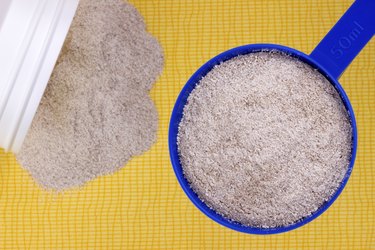
Athletes use whey protein, normally found in cow's milk, as a dietary supplement. Whey protein is also included in supplements for weight loss and in infant formula. The human body is able to absorb whey protein more efficiently than other types of protein. Consuming whey protein supplements can cause side effects, however. Consult your physician if you notice any changes in your stool or if you experience other side effects.
Identification
Video of the Day
Whey protein supplements vary in form. Some manufacturers minimally filter the whey protein, leaving carbohydrates with the protein. Other forms are very refined and just contain protein. Whey protein supplements may improve your physical performance. According to McKinley Health Center at the University of Illinois, people use whey protein to help maintain and build muscles. The supplement may also increase immune function and promote fat loss. However, there is not enough research to conclude that the supplement is effective for any of these uses.
Video of the Day
Side Effects
Whey protein supplements may cause side effects. Common side effects include fatigue, loss of appetite, headaches, thirst, cramping and bloating. Some users of the supplement also notice an increase in stool frequency. Some forms of whey protein contain lactose, which can be problematic for people who are lactose intolerant. Some people develop an allergic reaction to whey, as well. Signs of an allergic reaction include rash, hives, swelling and difficulty breathing.
Black Stools
Black stools may indicate that your stools contain blood. In such cases, the upper part of the gastrointestinal tract is bleeding. The upper gastrointestinal tract includes the stomach, esophagus and part of the small intestine. Blood appears black and tarry after it mixes with the body's digestive juices. Bloody stool is a side effect of an allergic reaction to whey protein. Infants who consume whey protein in their formula are more likely to display this side effect.
Precautions
If you notice black stools, consult with your physician. Blood in your stool can indicate a more serious problem, and your doctor should rule out underlying medical problems. There is no established dosage for whey protein supplements. If you are taking supplements, follow the package directions. Dietary supplements in the United States do not require FDA approval and are not subject to regulation. Choose a reputable manufacturer when purchasing whey protein supplements.